RAN DIGITAL | Performance Driven Agency

Mastering Keyword Research in SEO in 2024

SEO intern at RAN DIGITAL PVT LTD.

Table of Contents
Introduction:
If you are not supplying what your audience is demanding no matter how much hard work you have done but still your efforts may end up in vain. Have you ever wondered how some websites attract the right visitors towards them with so little effort? And how to ensure your content is not a drop in the ocean and will be delivered to your rightful audience? The answer lies in mastering keyword research in SEO. It is not just finding the popular keywords but is like going through your audience’s minds to what they want and then searching proper terms for it.
According to the research conducted by Ahrefs that says that 82% of marketers are actively investing in content marketing(keyword research), 10% report not using content marketing and 8% are unsure if their company uses content marketing. (ahrefs.com)
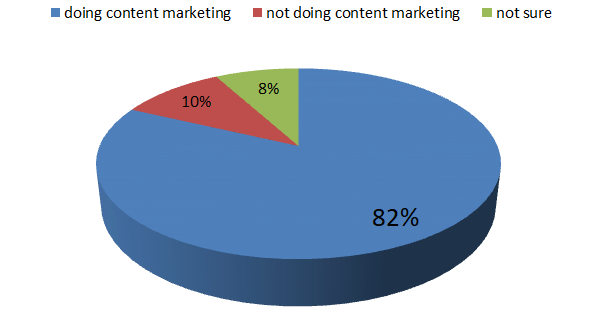
With the right keyword research strategy, businesses can see a 10x increase in organic traffic. Today we will guide you on how to master keyword research, ensuring you don’t fall behind in the digital race.
Keyword Research Basics:
Is mastering keyword research that important? The best answer to that is Mastering keyword research in SEO is important for success because it helps you understand what audience is searching the most and what are their needs and demands.
You may optimize your content to rank better in search engine results, improving your website’s visibility and drawing in more relevant traffic, by incorporating ranking keywords into your articles. It is essential to reaching your digital marketing objectives and increasing your internet visibility.
In this article, readers will learn how to master keyword research in SEO by understanding:

In this article, readers will learn how to master keyword research by understanding:
- What is Keyword Research in SEO and different types of Keywords?
- The Right tools and techniques for identifying effective keywords.
- How to Use Keywords Effectively in Content.
This guide will provide practical steps to enhance visibility, attract targeted traffic, and improve overall digital marketing success.
What is Keyword Research in SEO?
Keywords are like a compass for your SEO campaigns: they tell you where to go and whether or not you’re making progress. (backlinko). Keyword research in SEO is the process of finding and analyzing the words and phrases that users type in search engines when looking for information, products or services. These phrases or words represent the questions or topics that are most searched by the users.

It is the most important step in creating a successful SEO strategy. It helps the researcher understand the language of their target audience. Keyword research in SEO is used to enhance website content, improve visibility and attract more organic traffic.
Why Keyword Research in SEO Important?

In keyword research in SEO the keywords we choose directly impact where our content appears in search engine rankings. If we target the right keywords we are more likely to appear on the first page of search results which can lead to more traffic to our website. According to Ahrefs: If nobody is searching for what you’re writing about, you won’t get any traffic from Google—no matter how hard you try.
Keyword research in SEO is not just about finding popular words but it is about understanding what our audience is searching the most. By researching keywords we can access the questions and problems our audience is trying to solve. This helps us create content that meets their needs and expectations.
Now before going through the next part, you must know what basic types of keywords are and how we differentiate between them
Types of Keywords:
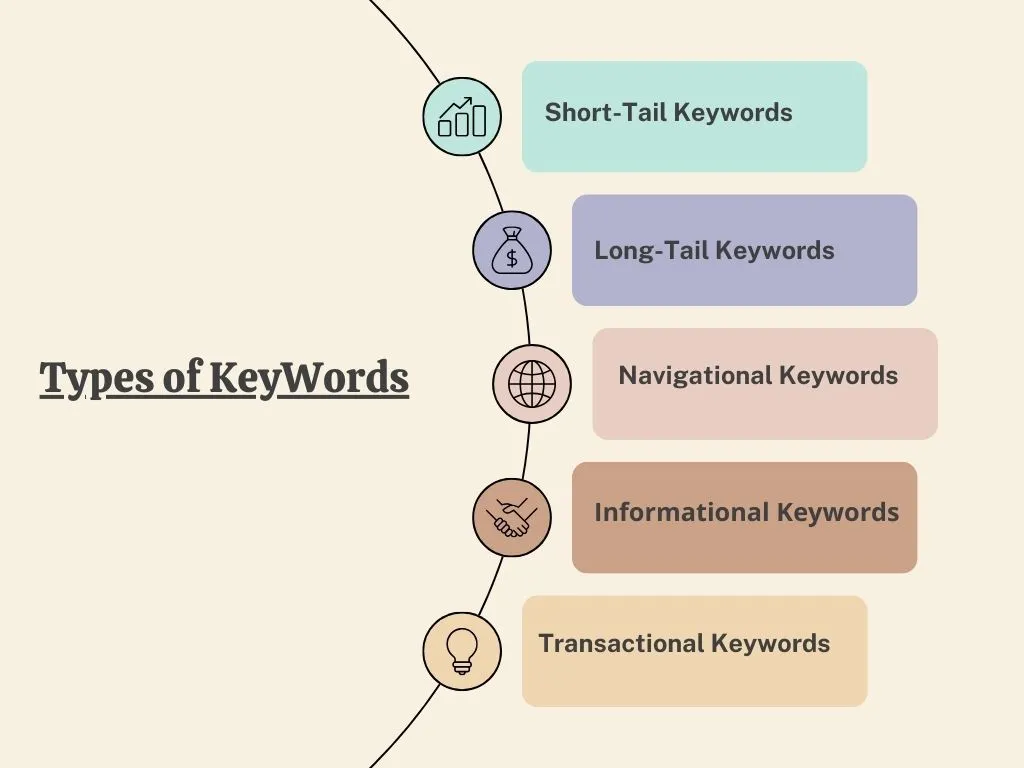
Short-Tail Keywords: They are short keywords usually one or two words long. They mostly have high search volume but also higher keyword difficulty. For example, “spoon” or “gaming mouse.”
Long-Tail Keywords: These types of keywords are two to three words. Long-tail keywords carry more detail than short-tail keywords. They mostly have low search volume but are less competitive due to less keyword difficulty making them easier to rank. For example “leather jacket for women” or “Top digital marketing agencies.”
Informational Keywords: Informational keywords are used when someone is looking for information. They are used in the initial stage when the person is looking for some information about something. Informational keywords are answers to questions that are searched by the audience. They mostly start with question words like “how to”, “what”, “when” etc. For example “benefits of chia seeds” or “how to make coffee”.
Navigational Keywords: They are used to find a specific website, brand or webpage directly. They typically involve brand names, specific product names or the names of services or websites. Users who use navigational keywords in their search already know what specific they want in the result. For example “Facebook”, “YouTube”, “Gmail” etc.
Transactional Keywords: Transactional keywords are directly linked to a specific action that leads to a purchase or other type of conversion. These keywords are often used by people who are ready to buy a product, sign up for a service or complete another action such as downloading an app etc. Examples of these types of keywords are “buy the latest iPhone”, “order pizza online” etc.
A Step-by-Step Guide on the latest Methods for Best Keyword Research in SEO:
Step 1: Identifying Your Niche and Audience

What is a niche? A niche is a specific content or area of your focus on which you want to work out. It is like focusing on a specific topic or group of people who have unique needs or interests. By targeting a niche you can offer something that meets the needs of a specific group making it easier to stand out and connect with them. For example in the category of travel “Luxury travel for couples” and in the category of pets “Training tips for rescue dogs” this can be used as a niche.
Understanding Audience Intent:
Understanding audience intent is about finding out what people want or what they need when they search for something online. It helps you understand the “why” behind their actions and allows you to enhance and improve your content, products or services to meet their specific needs.
When you align your content with the intent of your audience you are more likely to convert visitors into customers as you are providing exactly what they’re searching. Knowing your audience’s intent helps you craft more targeted marketing messages, whether through SEO or social media increasing the effectiveness of your campaigns.
Tools to Understand What Your Audience Is Searching For:
For understanding the audience intent tools like Google Trends, Ahrefs, Answer the Public and Semrush are most likely to be used.

Step 2: Brainstorming Seed Keywords
Brainstorming seed keywords is the process of generating basic terms related to your niche or topic. The seed keywords serve as foundation for more in-depth keyword research. It will help you discover more specific and targeted phrases that your audience might use.
How It Works?
Identify Main Topics: Start by listing the main topics that define your niche. For example, if your niche is “digital marketing,” core topics might include “SEO”, “content marketing” or “social media”.
Think Like Your Audience: Search what your target audience is interested in. What problems they are trying to solve and what answers do they need? For example, if they are small business owners they might search for “how to increase organic website traffic” or something like “affordable marketing options.”
Analyze Competitors: Deeply go through the competitor’s websites and blogs to see what topics they focus on and on what keywords are they ranking on. This can give you an idea about relevant organic keywords that are performing well in your industry.
Identifying Gaps in Your Content: By analyzing your competitor’s organic keywords you can find gaps and areas where they aren’t providing content or are underperforming so you can use their already ranking keywords in your blogs or articles. You can then create content to fill these gaps using targeting keywords that will help you improve organic traffic and clicks.
Step 3: Keyword Research in SEO Tools
Top Tools for Keyword Research in SEO: Utilize tools like
Google Keyword Planner, Semrush and Ahrefs to find popular search terms related to your niche. These tools can help you identify additional organic keywords based on search volume and relevance. These tools provide data on keyword search in SEO by providing volume, keyword difficulty, organic ranking keywords and cost-per-click (CPC).
Step 4: How To Do an Analysis Of the Tools
Firstly open Semrush and then go to the left section of the keyword overview.
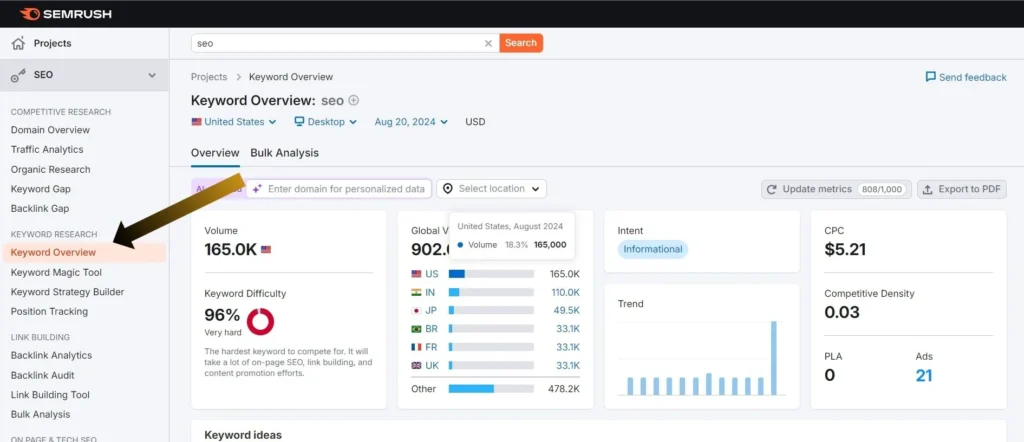
Now search for any topic you want and the data will be provided. In this example the term searched is “SEO”.
Search Volume indicates the total searches that are being done on the specific keyword.
For example, if the niche “SEO” is searched the following data is obtained.
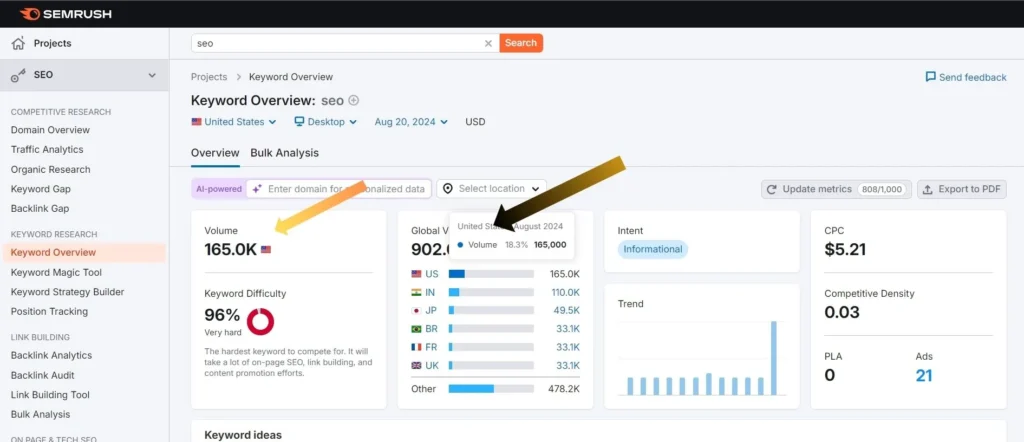
According to this image, the total search volume worldwide shown is 902.6k and only in the United States is 165.0k. You have to take a niche with a search volume more or equal to 25k.
Competition shows how difficult it will be to rank for that keyword. Now for the same example, the keyword difficulty is 96%. It is very high and therefore it is not possible to rank in the initial stages. We have to choose a niche with a keyword difficulty of not more than 20%.
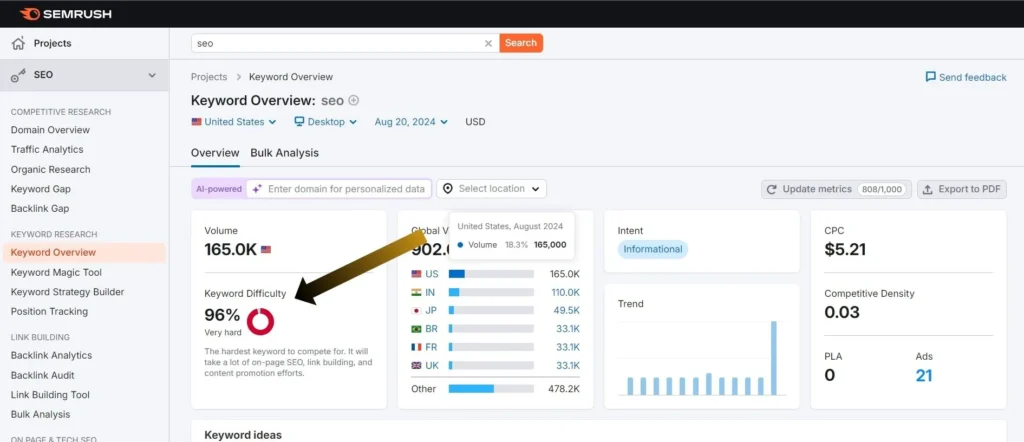
CPC or Cost Per Click is the amount of money a person pays whenever someone clicks on their online ad. It is like paying a small fee each time someone shows interest in their ad and clicks on it to get more information and knowledge. This way they only spend money when people engage with their ad. The higher the cpc is the more profitable it is. Here cpc is 5.21 and is very profitable.
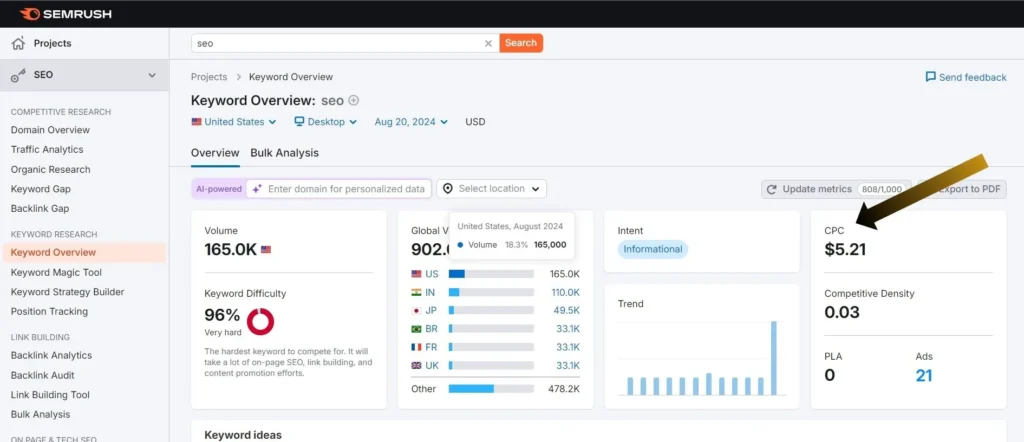
After you have selected your main keyword/niche. Now it is time to move to your next step which is finding similar/related keywords that are in the same category as that of keyword.
Step 5: Targeting Keyword
Identify Main Topic:
Once you have started searching for the niche you will come across of ocean of different categories. For that purpose, you can use Google Sheets for storing the data.
So you have to decide on one main topic/niche. The selection criteria depend on your thinking. You have to choose a topic on which you think you can write content that your audience will find interesting.
Study Your Topic:
After selecting a topic you have to get all type of information regarding it. No matter how much time it takes collecting all the relevant information is very important. For gathering important information you may get help using AI. For detailed information extensions like Google Scholar, Meta Ai, ChatGpt, and YouTube are used. You may also take help from the books if your topic is technical.
Step 6: Finding Similar Keywords
The following step involves finding similar keywords with the help of the tools. With the help tools you can search for the keywords that are related to your niche and have high keyword volume and less difficulity. The tools help you to do that just you have to do is search the organic keywords on which your competitor’s website is ranking. For example, if you are using Semrush you can access its keyword magic tool for finding similar keywords with less difficulty.
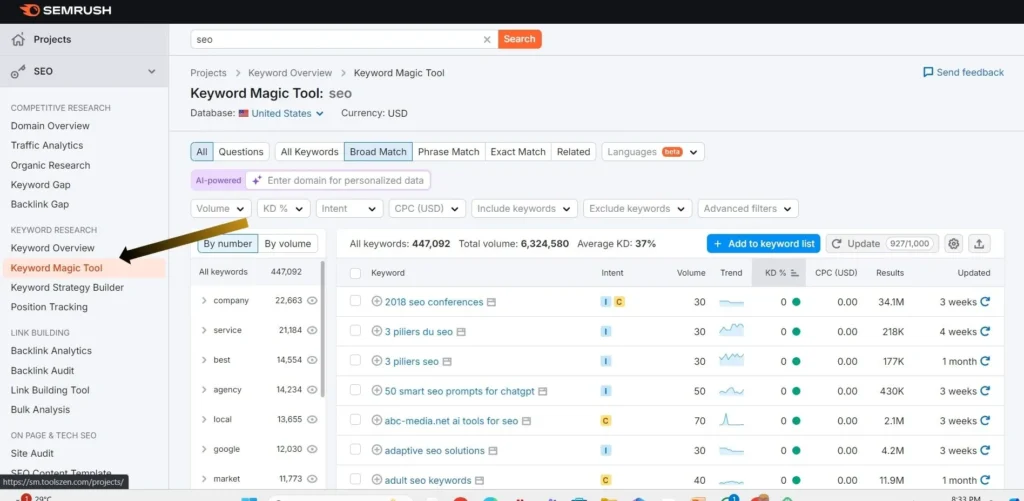
Here you can find plenty of similar searched keywords with less difficulty and more organic search volume.
You can also use BACKLINKO to find similar keywords.
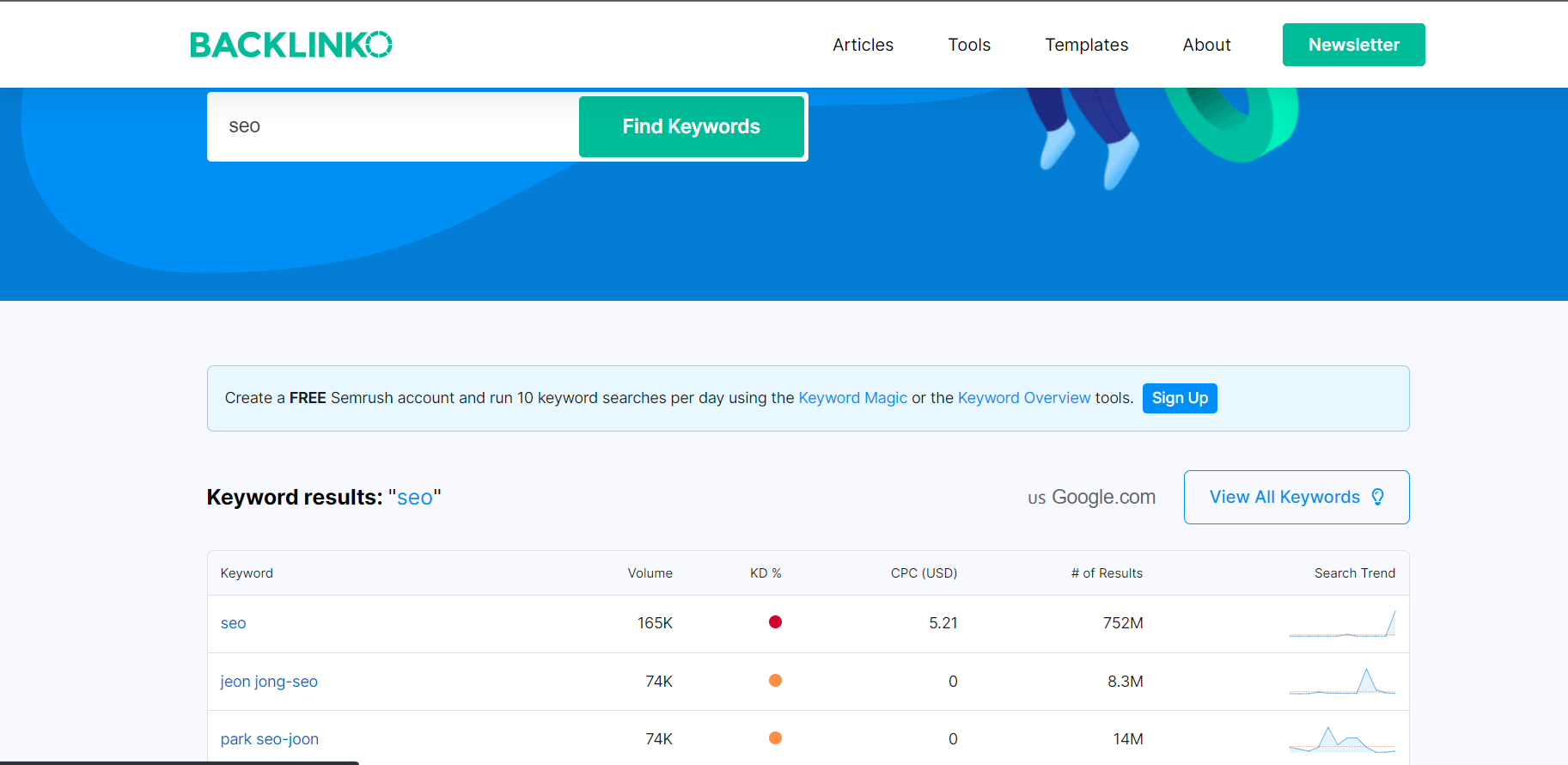
Step 7: Detailed Study of Your Keyword
Now before writing content, you must know how that topic is related to you and your audience. That topic is informational or that topic is commerical. If your topic is informational then complete detail of it’s informational traffic and if it is related to selling and buying then it’s purchasing traffic.
Step 8: Using Those Keywords In Your Content
All the low-difficulty and high-volume keywords you have found use them in your content. They are small words and letters but make a strong impact on your website traffic.
For that purpose, you have to write a blog post on your WordPress website. Plugins you must consider are Rank Math or Yoast.
While writing good content number of words does not matter at all. The main thing that matters is that your content is simple and in easy words so the reader should not feel any kind of difficulty in understanding it. Moreover, it should not include any irrelevant topic in it rather than the main topic. The reader should find the content interesting enough to read until the end. Here is a flow chart made by a digital marketing agency RAN DIGITAL for your help.
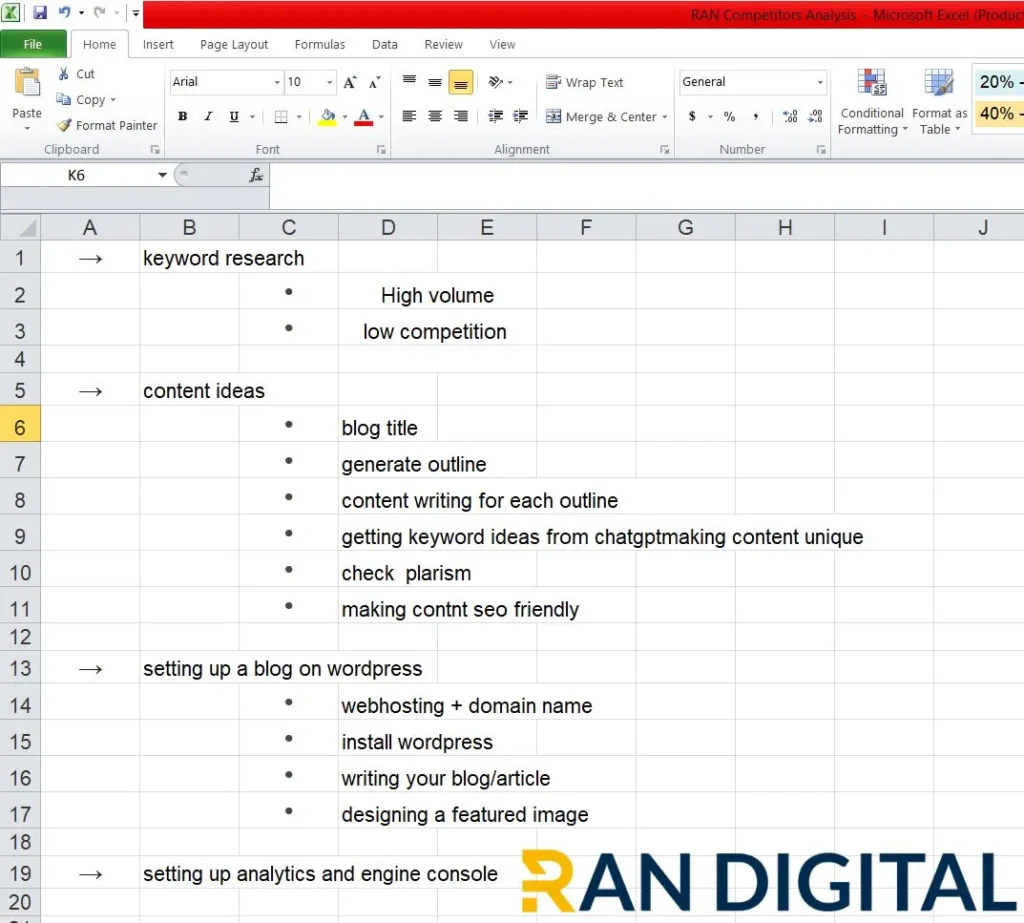
You must consider it compulsory to use the main keyword in the title, introduction, body and conclusion. It gives a positive impact to the reader that he has come to the right place to get the answer to his questions.
Ready To Learn More? We Can Help You.
If you want any other information regarding Mastering Keyword Research we are always here to help.
Schedule a free consultation with RAN Digital, a B2C marketing agency. We will help you cut through the marketing noise and craft a strategy that gets you results. Don’t wait – take control and watch your business flourish!